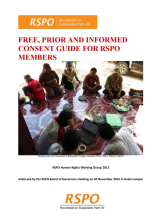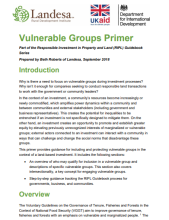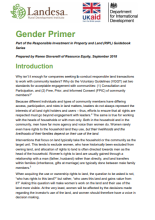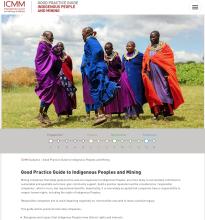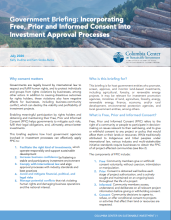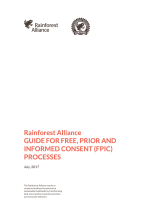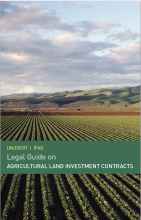Resources for Consultation & FPIC
Free, Prior and Informed Consent Guide for RSPO Members
This Guide provides advice for agribusiness companies on how to responsibly implement the FPIC principles in their operations. It is based on the revised RSPO standard (the Principles, Criteria and Indicators) pertinent to FPIC. The guide
• sets out the requirements of the RSPO Principles, Criteria and Indicators relevant to FPIC, and
• provides recommendations of best practice for how to achieve compliance with these requirements.
Free, Prior and Informed Consent Primer (Responsible Investment in Property and Land (RIPL) Guidebook Series)
This guide is directed at governments and companies seeking information on implementing FPIC principles in investment operations to safeguard the land rights of project-affected communities. It describes the key elements of FPIC, details steps that need to take place to ensure compliance with FPIC and lists additional resources that business enterprises can consult for further guidance on how to adhere to the principles of FPIC.
Gender Primer (Responsible Investment in Property and Land (RIPL) Guidebook Series)
This primer provides guidance for companies who seek to ensure that risks for project-affected communities are minimised, especially for women, who can be more vulnerable than men when it comes to land tenure. It provides step by step requirements to ensure that women as well as men are aware of and benefit from a proposed land transaction. For each step, the primer includes a checklist of questions to help guide the work and a list of resources where more detailed information can be found.
Good Practice Guide to Indigenous Peoples and Mining
This guide and its practical tools help companies:
• Recognise and respect that Indigenous Peoples have distinct rights and interests
• Understand that through law and/or custom, Indigenous People often have a special relationship to the land, territories and resources
• Utilise forms of engagements that are sensitive to cultural characteristics eg governance structures, interaction and decision making
• Understand that free, prior and informed consent (FPIC) should be regarded as a “principle to be respected to the greatest degree possible in development planning and implementation”
• Address issues requiring special attention to the interests and rights of indigenous groups
• Understand that historically, Indigenous Peoples have been disadvantaged, discriminated against and dispossessed of their land.
Government Briefing: Incorporating Free, Prior and Informed Consent (FPIC) into Investment Approval Processes
This briefing explains how host government agencies involved in investment processes can effectively apply FPIC to:
1. Facilitate the right kind of investments, which operate responsibly and support sustainable development
2. Increase business confidence by fostering a stable and participatory investment environment
3. Comply with international law and align approval processes with industry standards and best practices
4. Avoid and mitigate financial, political, and legal risks
5. Manage potential conflicts that risk violating human rights and damaging business operations and the national interest.
Guide for Free, Prior and Informed Consent (FPIC) Processes
This guidance is primarily directed at Rainforest Alliance auditors and farm or group administrator representatives that follow the Rainforest Alliance criteria. It can also be used more broadly by companies who aim to follow the FPIC principles in their operations. It describes
• the cases where an FPIC process is required; and
• the steps required in the FPIC process, in cases where an FPIC process is necessary.
Improving Governance of Forest Tenure. A Practical Guide
This guide proposes tools and approaches to improve forest tenure governance and practical actions to realise this objective. It is intended for government policy-makers, or other public sector, private sector or civil society stakeholders concerned with forest governance and tenure reform.
Legal Guide on Agricultural Land Investment Contracts
Investment in agriculture is essential for sustainable development, in particular for achieving food security, adequate nutrition, decent employment, poverty reduction and environmental protection. In seeking to attract agricultural investment, many governments and local communities have entered into Agricultural Land Investment Contracts (ALIC). Mindful of the contractual challenges involved and considering the importance of enhancing knowledge of the legal regime applicable to agricultural land investment operations, the International Institute for the Unification of Private Law (UNIDROIT) in collaboration with the International Fund for Agricultural Development (IFAD) have prepared this UNIDROIT/IFAD Legal Guide on Agricultural Land Investment Contracts (ALIC Legal Guide).
Negotiating Contracts with Investors - Guide 2 For community members and advocates interacting with potential investors
This guide for legal advisors, community leaders and members builds on Guide 1 in this series. If a community decides to negotiate with a potential investor, this guide describes issues that can be included in a community–investor contract. It also explains what language should be avoided in the contract. It is designed to help communities negotiate a contract with an investor that is clear, fair, and equitable.
Participating in Socially Responsible Land Investment - Model Guidebook for Communities Considering Agricultural Investment
This guide takes communities and their leaders, and 'ocal and national civil society organisations, through the steps needed to ensure that land investments in the community are carried out inclusively and responsibly.


